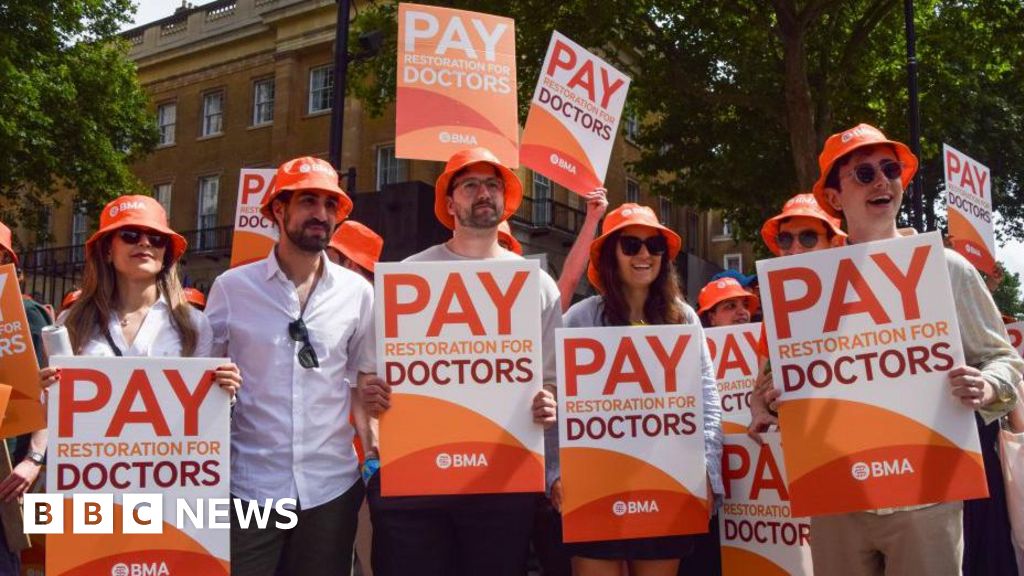Every step is a struggle for Bruce Zimmerman, whose health has been deteriorating since he was diagnosed with multiple sclerosis eight years ago.
In 2019, Zimmerman said, his then-employer offered him an opportunity that sounded irresistible: He and his wife, Becky, could take all-expense-paid trips to the Cayman Islands and the Bahamas to retrieve the medication he needed, Avonex, a drug made by Biogen that currently retails in the U.S. for $2,159 per weekly dose. Through Florida-based PriceMDs, which paid for the couple’s travel, Zimmerman’s Avonex would be free of charge.
PriceMDs is part of a growing class of businesses called alternative funding programs, or AFPs, which promise to connect patients with more-affordable options for accessing specialty medications that often come at very high costs. AFPs contract with employer-sponsored health plans to offer coverage on specialty drugs.
While PriceMDs has taken the business model to another level, flying patients such as Zimmerman to other countries to bring back their drugs themselves, AFPs more typically obtain the medications overseas for significantly less than what they cost in the United States and get them shipped directly to patients. The savings can at times be so large that AFPs, at least in the case of PriceMDs, can send patients on Caribbean trips and still make money.
“They stressed … to me: It’s the exact same medication that I was taking at the time,” Zimmerman said. “I couldn’t believe what an awesome program it was.”
But AFPs come with a major catch: Federal authorities say importing medications intended for foreign markets is illegal and could pose risks to patients’ health.
“These alternative funding programs are fulfilling prescriptions through unverified suppliers and online pharmacies, potentially illicit,” said Nicole Johnson, a special agent with Homeland Security Investigations, an agency within the Department of Homeland Security.
“And they’re not actually importing the drugs themselves,” she said. “The prescriptions are getting mailed directly to the patients. Therefore, Customs [U.S. Customs and Border Protection] has no idea how many prescriptions have made it to U.S. citizens, how many have come from verified places.”
Johnson, who is also national program manager for the department’s National Intellectual Property Rights Coordination Center, told CNBC that Homeland Security has launched several criminal investigations into AFPs.
A CNBC investigation found AFPs are becoming more pervasive around the country as drug costs skyrocket. CNBC submitted nearly 100 public records requests and sorted through more than 10,000 pages of contracts, emails, invoices and complaints that show these companies have penetrated the country’s health-care system through private employers, cities, counties, school districts and unions. In some cases, employers are requiring their staff to use an AFP.
CNBC traced the trail of medications from abroad to the U.S. via a supply chain that’s not authorized by the pharmaceutical companies that manufacture the medications.
“No patient, no American should ever have to be forced to take a medication that’s going to put their life at risk,” Johnson said, speaking for the first time publicly about AFPs.
Nicole Johnson, special agent with Homeland Security Investigations.
CNBC
The AFPs defend their business practices as both legal and safe and say their businesses are an antidote to high prescription drug prices. Those prices, across all drugs, in the U.S. are nearly three times as much, on average, as those in other high-income countries, according to a 2024 report by Rand, a nonprofit, nonpartisan research organization.
Greg Santulli, CEO of Georgia-based AFP Rx Valet, told CNBC he’s so confident in the medications his company sources that he felt comfortable with his own parents taking drugs brought in from overseas for years, and he said they experienced no problems.
“If I was putting lives at risk, I put my own parents at risk,” he said. “We’re committed to helping small and midsize American companies [be] able to afford health insurance for their employees in a reasonable manner.”
Employers who opt to use an AFP typically pay their staff’s health-care costs out of pocket. AFPs help reduce the cost of the most-expensive specialty drugs, such as those to treat cancer and cystic fibrosis that can cost hundreds of thousands of dollars a year.
While not all AFPs import medicines from overseas, the ones that do promise outsized savings. The companies charge employers fees or take a percentage of the savings.
Patients such as Zimmerman typically don’t know the full extent of how AFPs work, or that their medication may be illegally crossing borders.
Zimmerman said he eventually left the employer that contracted with PriceMDs after his MS progressed to the point where he could no longer perform his job safely. Now, he says, his new insurance doesn’t consistently cover his medication.
“I’m in danger of not having any of my medication at all. At least then I had the medication,” he said, of being in the PriceMDs program. “At one point you don’t care if it’s illegal. If I would have been told that, I say, send me the ticket.”
Bruce Zimmerman and his wife, Becky.
CNBC
‘Sales pitch’ vs. safety?
AFPs are typically small, for-profit companies and are located across the U.S. They are not usually affiliated with insurance companies or employers directly, but rather are third-party vendors.
While there have been limited studies about AFPs, no one is officially tracking their growth and overall impact on the health-care system. In the last several years, as prescription drug prices have soared, more AFPs are opening up, documents show, and sourcing high-cost medications for a fraction of the price to patients in places including Canada, Australia and Turkey.
The savings often seem too good to pass up, but the process isn’t always straightforward.
A study of 260 patients using AFPs that was released in October by the Vanderbilt Health System Specialty Pharmacy Outcomes Research Consortium found the patients were experiencing significant barriers and delays in access to treatment. They waited an average of 41 days to receive their medications, compared with 15 days for patients who did not use AFPs, according to the study.
In one case, a 34-year-old patient with Stage 4 colorectal cancer was told by an AFP that he had to obtain a passport and complete a telehealth visit with an international provider before receiving his medication, according to the study. After a five-month delay, he finally got a three-month supply shipped from an international pharmacy, the study found.
Other patients said they were required to receive medicine from overseas or were switched to different drugs that worsened their conditions, according to the Vanderbilt study.
“It’s a sales pitch on the backs of the safety of the patients. Patients take a safety hit in order to save an employer money,” said Shabbir Imber Safdar, executive director of the Partnership for Safe Medicines, a coalition of nonprofit and pharmaceutical industry groups.
Shabbir Imber Safdar, executive director of the Partnership for Safe Medicines.
CNBC
Safdar said his organization has been investigating AFPs for the past two years and that it has found that about $5 million worth of what he said was illegally imported medicine has been provided to patients in the past two years. He said many AFPs have grown because the medications are supposedly sourced from trusted countries such as Canada, the U.K. or Australia.
“They think, oh, Canadian medicine is safe, but you don’t actually know if that medicine truly came from Canada,” he said.
In one instance, Safdar said, patients thought they were receiving Canadian drugs, but the fine print of the pharmacy’s website revealed it also dispensed medications from “international fulfillment centers around the world,” including in Turkey and India.
Turkey is one of the world’s largest suppliers of counterfeit medicines, according to the Office of the United States Trade Representative.
Even if patients read the fine print, they may not be able to opt out.
Emails obtained by CNBC through a public records request show that the city of Lebanon, Missouri, told government staff their medication “must be obtained” through an AFP called SHARx. If employees did not use the SHARx program, their “high-cost medication will no longer be covered” and they would be “required to pay the full price,” the email said.
The city of Lebanon declined CNBC’s request for comment.
“It’s no choice at all,” Safdar said. “Patients are put in an impossible position, and it’s a crime that they’re still paying health-care premiums, and yet they are not getting FDA-approved medicine, legal medicine or safe medicine.”
In a statement to CNBC, SHARx cited the high cost of drugs in the U.S. and said, “We help employees access the medications they need when their medications are not covered by insurance.”
FDA drug seizures
The central question for AFPs is the legality of personal importation of prescription drugs into the U.S.
The U.S. Food and Drug Administration allows Americans to import medications for individual use if the drug is not available domestically. That’s the basis on which the AFPs built their models for shipping medicines directly to the patients.
But an FDA spokesman said in a statement to CNBC that “in most circumstances, a person cannot import prescription drugs from other countries into the U.S. … as substitutes for FDA-approved drugs.”
“Medicines from outside the legitimate U.S. drug supply chain do not have the same assurance of safety, effectiveness, and quality as drugs subject to FDA oversight,” the spokesman added.
Leigh Verbois, who worked at the FDA for nearly 23 years — the last five as director of the agency’s Office of Drug Security, Integrity, and Response — said AFPs are not covered by the agency’s personal importation policy.
Leigh Verbois, former director of the FDA’s Office of Drug Security, Integrity and Response.
CNBC
“If it’s not approved or available clinically in the U.S., an individual can obtain a product from a foreign source, assert that they are importing that product for themselves, and then bring that product under a limited supply of 90 days into the United States,” said Verbois, who left the FDA in April.
However, she said, “there’s no gray area when the product is approved in the United States and they are being commercially purchased and brought into the United States.”
Verbois said she doubts most patients realize that the medications they’re getting are not FDA-approved.
“I don’t think the average patient understands the complicated nature of the distribution practice that’s happening,” she said.
In 2023, the FDA seized medication being shipped by a Canada-based AFP called CANARX, according to an email sent to a patient that was obtained by CNBC.
The FDA wrote that it seized the medication for being potentially “misbranded” and “counterfeit” and said the patient did not “qualify to receive this medication under the personal importation policy.”
The action came after a 2019 warning letter from the FDA to CANARX saying the company was operating “in a manner that substitutes the FDA-approved drugs prescribed by the U.S. healthcare provider with unapproved drugs.”
In response to the warning, CANARX said it was not misleading patients but it did agree to stop importing drugs that need to be administered by a doctor, according to the company’s general counsel, Joseph Morris.
Morris told CNBC the medicine shipped to U.S. patients by CANARX comes from highly regulated, “tier one countries” such as Canada, the U.K. and Australia, which he said have standards similar to those in the U.S. for regulating prescription drugs.
Joseph Morris, general counsel for CANARX.
CNBC
“Built into my client’s program are the safety precautions that ensure that the medicine is real, that it’s coming through a legitimate supply chain, that it’s coming from a recognized manufacturer, that it is what the patient’s doctor is ordering to be delivered to that patient,” he said.
Exploiting ‘ambiguities’
Morris said there are “ambiguities” in the FDA’s rules around personal drug importation. He acknowledged the policy prohibits importing medications that are available for sale in the U.S. but argued that affordability is a crucial part of access.
A drug may be available in the U.S., he said, but if its price puts it out of reach for patients, availability becomes irrelevant, especially when the same medication can be found just across the border in Canada for a fraction of the cost.
Morris said drug seizures like those conducted by the FDA in 2023 happen several times a quarter. He said he occasionally advises individual patients on how to reach out to U.S. Customs or the appropriate agency, explaining who they are and what the shipment contains, in order to request the release of their medication. In most cases, he said, the issue is resolved without problems.
He said the U.S. Department of Health and Human Services can grant waivers to individuals “on a case-by-case basis” for the importation of prescription drugs.
Morris said CANARX contracts directly with the patient — not a government entity or private employer — so no one is forced to accept an imported drug.
CANARX’s patient contract requires customers to agree that they have purchased medications “internationally for personal use” and that the title to the medication passes to the patient when it is shipped. The agreement also says patients must “release the plan holder, its officers, employees, agents, heirs” from “any and all causes of actions with respect to errors or omissions by CANARX in obtaining the prescription medications.”
CNBC showed Homeland Security’s Johnson a copy of the contract. She said it’s a tactic to avoid responsibility.
“Even if they write this in a contract, that doesn’t mean that they’re not violating U.S. federal and state laws,” she said.
In 2023, the FDA also sent a warning letter to an AFP called ElectRx and Health Solutions.
The FDA letter said the company’s drug importation program “poses significant health risks to U.S. consumers.” The company responded in a statement posted to its website that its personal importation of medicines was legal.
ElectRx was offering medication from overseas through its personal importation program as recently as this year, according to drug listings on the company’s website viewed by CNBC. ElectRx and Health Solutions declined to comment for this article, and by October, after CNBC reached out, the company’s website had been taken offline.
The FDA spokesman, when asked why these AFPs are still allowed to operate, said the agency could not comment on “ongoing compliance issues.”
The Caribbean connection
Bruce Zimmerman was one of those patients who thought everything was fine, picking up his medication and flying it back to the U.S.
The Zimmermans, from St. Helena Island, South Carolina, took several trips to the Cayman Islands and the Bahamas through PriceMDs between 2019 and 2021. The company set up the travel and all the accommodations, the couple said.
“We tried to take in all that we could,” Zimmerman said, describing his trips prior to his health deteriorating further. “We went swimming with stingrays. We went to Starfish Point. I went scuba diving, and I got a license so I could scuba dive, and then took three scuba diving trips.”
Each time, he said, the couple would bring back a three-month supply of medication. “When it was up, time to call them to get another flight,” he said.
Zimmerman said he closely examined the medication he received and that the Avonex looked exactly the same as what he had gotten at U.S. pharmacies. He also said he experienced side effects similar to what he was used to.
But Turkish Customs data analyzed by CNBC showed that PriceMDs has previously rerouted shipments of Avonex meant for one country to another and sold it through unauthorized channels.
From 2020 to 2023, around the same time the Zimmermans were making their Caribbean trips, PriceMDs sourced Avonex that originated in Germany, passed through Customs in Turkey via a Turkish exporter, then made its way to the Cayman Islands, the Bahamas, Switzerland or the United States, according to the Customs data.
Biogen, Avonex’s manufacturer, told CNBC this route is “not part of Biogen’s authorized supply chain” and that it does not have any “direct customers or ship-to locations in either the Cayman Islands or Bahamas.”
Since 2020, Turkish Customs data shows, PriceMDs has imported more than 1,200 different drugs into the country, valued at more than $2.7 million.
PriceMDs declined multiple requests to comment for this story.
When asked if he was concerned about the origin of the drugs provided by PriceMDs, Zimmerman — even knowing that the shipping routes might have been illegal — said he might still have taken the chance.
“If I was faced with it, I would do it again,” he said. “It’s such a desperate thing to think that you might not have your medication at all.”
‘A game of Russian roulette’
Last year, when a Maryland HIV patient reported to his doctor that his medication, Gilead Sciences-made Biktarvy, was mailed from Turkey, with the bottle label and instructions written in Turkish, the drugmaker traced the shipment back to Rx Valet.
The case ultimately involved a web of companies across the health-care industry, and Gilead filed suit in December in U.S. District Court through attorney Geoffrey Potter of Patterson Belknap Webb & Tyler, a New York City-based law firm handling illegally diverted and counterfeit pharmaceutical cases.
Bottles of Biktarvy sourced from Turkey that are at the center of a Gilead lawsuit against AFPs.
CNBC
The company sued not only Rx Valet, for sourcing the medication from overseas, but also Meritain Health, which manages employee health plans and is part of CVS Health-owned Aetna, as well as several other companies connected to the Biktarvy shipment. Meritain contracted with one of the companies that used Rx Valet to source the medications.
“As you can understand, receiving lifesaving medicine from a mysterious source in a language you can’t read was quite concerning. [The patient] did not know if the product was safe, genuine, and so they reported it to their health-care provider,” said Lori Mayall, who oversees anti-counterfeiting and product security at Gilead Sciences.
The company’s testing determined the medication was real Biktarvy but was intended to be sold in Turkey and not permitted to be shipped to the U.S., Mayall said.
She said that once a drug gets out of Gilead’s supply chain the company cannot guarantee that what’s in it “is safe and effective” for the patient.
“Every time you’re taking a foreign medicine that’s been delivered from overseas, you’re playing a game of Russian roulette,” she said.
When asked about the high drug costs that Americans face, Mayall said that HIV medication such as Biktarvy is fully covered in the U.S. for patients with insurance. Gilead has a free drug program for patients who don’t have insurance, the company said.
“[AFPs are] promising savings, but they’re delivering risk,” she said. “And when it comes to prescription medicines, prioritizing cost over quality is dangerous.”
Rx Valet CEO Santulli said what his company is doing is both legal and safe.
“We have created an ecosystem that allows individuals to save money on high-cost medications, as well as low-cost medications,” Santulli said. “We provide thousands of generic medications at really low cost. And we also find ways to help people get expensive medications, branded and specialty medications through various programs.”
Greg Santulli, Rx Valet CEO.
CNBC
He said Rx Valet obtains specialty medications from Canada, Australia and New Zealand, all “tier one” countries.
Judge’s injunctions
Like many AFPs, Rx Valet says importing drugs is legal under the FDA’s personal importation policy. When pressed further about the legality of importing medications that are already available for sale in the United States, Santulli declined to comment further.
When asked about the Maryland patient who received Biktarvy that was intended for sale in Turkey, Santulli said Rx Valet does source medication from Turkey and that it is a “modern, sophisticated country” capable of tracking medications throughout its supply chain.
A spokesman for CVS Health, Meritain’s parent company, said it “has long maintained a policy that it does not support programs for non-FDA-approved medications sourced from outside the United States and does not contract with companies to facilitate the importation of non-FDA-approved medications” from overseas.
The company said it “strongly disputes the allegations” made in Gilead’s lawsuit and is “vigorously defending itself against the complaint.”
In June, the judge in the case issued a preliminary injunction prohibiting the defendants from importing Gilead medications, writing: “The risk of harm to Gilead’s good will and reputation among the patient and healthcare providing relevant community is stark and acute.”
All the defendants have appealed the ruling.
The Turkish pharmacy that shipped the Biktarvy to the patient in Maryland did not respond to CNBC’s request for comment.
In September, Gilead added other AFPs — CANARX, ElectRx and a Florida-based company called ScriptSourcing — to the lawsuit. CANARX and ScriptSourcing denied the allegations, and ElectRX declined to comment on the case.
The judge issued another preliminary injunction in October that prohibits the three companies that were added to the lawsuit from shipping Gilead medications from overseas. The case is pending.
For the sake of the patient
The Cystic Fibrosis Foundation and other organizations say the price of AFPs is too high.
The foundation is one of several nonprofit groups that represent patients with severe diseases and say they have been warning the FDA for years about the dangers of AFPs.
“The biggest concern is the patient is the pawn here, right?” said Mary Dwight, senior vice president and chief policy and advocacy officer at the foundation. “The bottom line is that the person living with a chronic, life-threatening illness is being asked to jump through all these hoops just to make sure they have the treatments that they need.”
Mary Dwight, senior vice president and chief policy and advocacy officer at the Cystic Fibrosis Foundation.
CNBC
Dwight said AFPs are “finding cracks” in the existing foreign importation regulations and that more enforcement is needed to stop these illegal practices.
The U.S. House Appropriations Committee in June said it has “deep concern over the health risks posed by illegal importation of unapproved and misbranded drugs,” particularly through AFPs. Given what it called these “significant dangers,” the committee directed the FDA to provide a “comprehensive report” on how to strengthen oversight.
Separately, in September, top executives of patient advocacy groups attended a bipartisan briefing on AFPs sponsored by U.S. Reps. Rick Allen, R-Ga., and Lucy McBath, D-Ga.
“Patients are put in an extremely difficult position,” McBath said in a statement. “They can’t go without their medication, but the potential overseas drug options carry their own risks. … No patient should ever have to gamble with their health like that.”
Allen said in a statement, “These programs need greater scrutiny and stronger safeguards, which is why I led a bipartisan effort demanding more information on how these programs are being regulated, how patients are being protected, and how employers can ensure they are not being misled.”
“Why are we making individuals with a life-threatening disease, chronic illness be the guinea pigs for something that we thus far have said is not the way we’re going to go in U.S. health care?” Dwight asked. “It’s a broken system, and we need to make sure everyone is paying attention.”
— CNBC’s Alexandra Evans contributed to this report.





